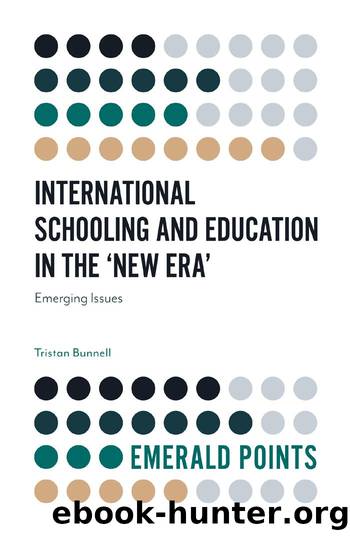International Schooling and Education in the 'New Era' by Bunnell Tristan;

Author:Bunnell, Tristan;
Language: eng
Format: epub
Publisher: Emerald Publishing Limited
Published: 2019-02-06T00:00:00+00:00
A CAPITAL(S) ACCUMULATION FRAMEWORK
The Desire for Symbolic Capital Accumulation
What we can begin to deduce here is that the term International has substantial symbolic value, as a sign and measure of prestige and class status; âan International Education, whether at home or abroad, equally denotes, something globally valid and hence distinct and better than the normal pathway of educationâ (Basaran & Olsson, 2017, p. 98). In this context, we need new ways of looking at the demand-side growth factors.
Machin (2017, p. 139), for example, identifies âInternational Schoolsâ in Asia as âVeblen Goodsâ (or, âSnob Goodsâ), which defy normal economics concerning the link between demand and prices. It is said that: âDespite the laws of economics, in these markets as school fees have risen demand has also increased, and at a proportionally faster rateâ.
This issue, the emergence of some GEMIS offering conspicuous consumption, implies that an aspiring âmiddling classâ is buying into the field ostensibly to âshow-offâ and prove its new-found credentials (unlike the established mobile elite and âmiddle classâ who have no requirements to prove their status). Yet, how sustainable is this type of growth? At what point does growth undermine the âsnob appealâ?
Ball and Nikita (2014) suggest that parental choice research should extend its focus to the âtransnational familyâ, following Huang and Yeohâs (2005) study into Singaporeâs Chinese âstudy mothersâ. Put simply, these parents are no longer predominantly internationally mobile families moving across national borders for work. This view is now too naïve and simplistic. Instead, there is a growing population of nationals (âlocalsâ) attending GEMIS and much of this involves a new middle class seeking social and economic production as well as the traditional ruling class elites seeking social and economic re-production (Young, 2017).
A key point to observe here is that the âlocalâ kids are not involved by âaccidentâ but have been deliberately positioned in the arena. It is said (Emenike & Plowright, 2017) that they occupy a âthird spaceâ, between school and home, thus maybe the term Third-space Kids (TSKs) might now be more apt.
One aspect of the GMC that might be worth investigating involves the playing of new âgamesâ to facilitate long-term prosperity. One underreported âgameâ being played by parents, involves so-called birth tourism and foetal citizens (Wang, 2017). This complex game involves heavily-pregnant women flying from southeast Asia to southern California to give birth, at considerable financial expense, thus gaining the child US citizenship and subsequent entry to GEMIS in China and higher education entry back âhomeâ in America. Further, the child at the age of 21 can invite the parents to move to America, creating in the long-term a beneficial retirement plan for the parents.
This is an inventive, relatively new phenomenon. The moral of this story is that we cannot assume that a child in a GEMIS with an American passport has actually lived in America, which greatly complicates the perceived weakening TCK concept and even adds to its worth of continuous study. In other words, we would be wrong to right-off the TCK concept, as it still exists but in surprisingly new formats.
Download
This site does not store any files on its server. We only index and link to content provided by other sites. Please contact the content providers to delete copyright contents if any and email us, we'll remove relevant links or contents immediately.
Chicken Soup for the Soul Presents Teens Talkin' Faith by Jack Canfield(638)
Understanding PDA Autism in Kids: A Guide for Parents and Teachers to Support Neurodiverse Learners by Jehu Len(554)
The Victorian Era: A Captivating Guide to the Life of Queen Victoria and an Era in the History of the United Kingdom Known for Its Hierarchy-Based Social Order by Captivating History(422)
Brain Teasers to Build Critical Thinking Skills by Safarova Kris(411)
Brain Teasers to Build Critical Thinking Skills: Brain Exercises for Tech, Banking, Case Interview Prep, and to Keep Your Mind Sharp by Kris Safarova(411)
100 Ideas for Secondary Teachers: Engaging Parents by Janet Goodall & Kathryn Weston(386)
Python 101 - Fundamentals by Sam(373)
Critical Curriculum Leadership : A Framework for Progressive Education by Rose M. Ylimaki(361)
Writing Solid Code: Development Philosophies for Writing Bug-Free Programs by Steve Maguire(356)
The Art of Emotional Validation: Improve Your Communication Skills and Transform Your Relationships by Validating Emotions and Feelings by Emily Wright(338)
Intersectionality in Educational Research by Dannielle Joy Davis; James L. Olive; Rachelle J. Brunn-Bevel; Susan R. Jones(331)
The Knights Templar: An Enthralling History of the Rise and Fall of the Most Influential Catholic Military Order by Wellman Billy(327)
A Beginner's Guide to SSD Firmware by Unknown(327)
The Future Knowledge Compendium by Ellyard Peter;(319)
How to be assertive in any situation by Hadfield Sue & Hasson Gill(309)
Making Connections in and Through Arts-Based Educational Research by Hala Mreiwed Mindy R. Carter Sara Hashem Candace H. Blake-Amarante(305)
Foundations of Educational Research by Victoria Elliott(305)
What Every Teacher Should Know about Learning, Memory, and the Brain by Tileston Donna E. Walker;(305)
Message from the Pleiades; The Contact Notes of Eduard Billy Meier v1 only by unknow(301)
